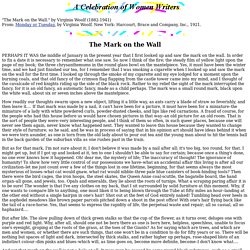

Tales of Mystery and Imagination: Jean Rhys: The Day They Burned the Books. My friend Eddie was a small, thin boy.

You could see the blue veins in his wrists and temples. People said that he had consumption and wasn't long for this world. I loved, but sometimes despised him. His father, Mr Sawyer, was a strange man. Nobody could make out what he was doing in our part of the world at all. He was agent for a small steamship line which in those days linked up Venezuela and Trinidad with the smaller islands, but he couldn't make much out of that. Mrs Sawyer must have been very pretty once but, what with one thing and another, that was in days gone by. When Mr Sawyer was drunk — this often happened — he used to be very rude to her. 'Look at the nigger showing off,' he would say; and she would smile as if she knew she ought to see the joke but couldn't.
The story went that once they had ventured to give a dinner party and that when the servant, Mildred, was bringing in coffee, he had pulled Mrs Sawyer's hair. Of course, Mrs Sawyer had her compensations. 'Why not? Hills Like White Elephants. MISS BRILL1920. Angel’s Laundromat. In his review of A Manual for Cleaning Women, Dwight Garner wrote in The New York Times that Lucia Berlin is “the real deal.

Her stories swoop low over towns and moods and minds.” We couldn’t agree more and, in addition to Stephen Emerson’s introduction to the book that we shared last week, are now pleased to share the first story in this collection, “Angel’s Laundromat.” A tall old Indian in faded Levi’s and a fine Zuni belt. His hair white and long, knotted with raspberry yarn at his neck. The strange thing was that for a year or so we were always at Angel’s at the same time. Mrs. She died on a Monday and I never went back to the San Juan. For months, at Angel’s, the Indian and I did not speak to each other, but we sat next to each other in connected yellow plastic chairs, like at airports. He used to sit there sipping Jim Beam, looking at my hands.
Finally he got me staring at my hands. TheBoat. A Christmas Memory. The Lady with the Dog. Ln000341. GoodOldNeon. Strange Hotel. London?

Paris xSt PetersburgMoscowBudapest xBratislava xWarsaw xCracow xHaworth xSt Austell xBeijing xTokyo xSt Petersburg xBucharest xCraiovaParis xKhartoumBarcelona xCairo xRiga xAmsterdam xMilanFlorence xSorrento xNaples xRome xAvignon xSantarcangelo di RomagnaBrussels xSiena xBagno VignoniVeniceBerlin xDublinDonegalBallycastleBelfastNew York xNewark xFolkestone xManchester xEdinburgh xGlasgowStratford-upon-AvonNorwich xAvignon She has no interest whatsoever in France. The subject is unbroachable with her. She disregarded it as best she could on the train from Nice. She did not absorb her cab ride here.
The Mark on the Wall. "The Mark on the Wall.

" by Virginia Woolf (1882-1941) From: Monday or Tuesday. by Virginia Woolf. New York: Harcourt, Brace and Company, Inc., 1921. PERHAPS IT WAS the middle of January in the present year that I first looked up and saw the mark on the wall. In order to fix a date it is necessary to remember what one saw. So now I think of the fire; the steady film of yellow light upon the page of my book; the three chrysanthemums in the round glass bowl on the mantelpiece.
Yes, it must have been the winter time, and we had just finished our tea, for I remember that I was smoking a cigarette when I looked up and saw the mark on the wall for the first time. How readily our thoughts swarm upon a new object, lifting it a little way, as ants carry a blade of straw so feverishly, and then leave it.... But as for that mark, I'm not sure about it; I don't believe it was made by a nail after all; it's too big, too round, for that. Samanta Schweblin. Samanta Schweblin: Toward Happy Civilization. He’s lost his ticket, and from behind the ticket window’s white bars, the station agent refuses to sell him another, saying there’s no change in the drawer.

From a station bench, he looks at the immense, dry countryside that opens out to either side. He crosses his legs and unfolds the pages of the newspaper in search of articles that will make the time pass faster. Night begins to cover the sky and far away, above the black line where the tracks disappear, a yellow light announces the afternoon’s last train. Gruner stands up. The newspaper hangs from his hand like an obsolete weapon. But when he reaches the window, when the train’s lights lengthen the shadows and the whistle is loud and intrusive, Gruner discovers that there is no one behind the bars, only a tall chair and a table overflowing with unstamped slips, future tickets to various destinations.
Everything is still and silent. Preserves - Words Without Borders. 2017 Man Booker International nominee Samanta Schweblin’s arresting short story sees a couple take unusual measures to address an unwanted pregnancy.

A week, a month go by and we’re getting used to the idea that Teresita will get the jump on our plans. I’m going to have to give up the fellowship because in a few months it’s not going to be easy to continue. Maybe not because of Teresita, but out of sheer anguish, because I can’t stop eating and I’m starting to get fat.